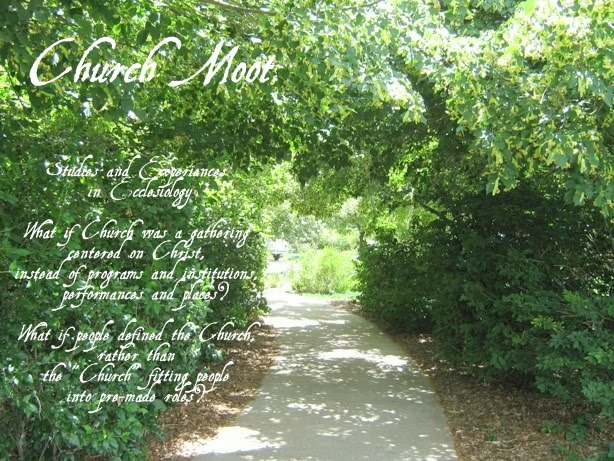"Moot" is so old that we hardly use it. Tolkien used it because it was old and English. When I write about the Church so much, and am trying to emphasize original meaning instead of what the word has come to mean in our culture (I despise redefinitioning), I resort to long explanations each time I describe what happens when the people of God get together. One can use Greek, ekklesia, or start by defining the English word, church (which has so many uses now that it is about as ineffective as love), or say assembly, meeting, gathering, or fellowship. Assembly reminds people either of six grades of public school children seated in the cafeteria, or when speaking of religion, the semi-charismatic Assembly of God denomination. Meeting was actually used in its common sense (I have a meeting to attend) by nonconformist religious groups, and continues to be used by the Quakers. Gathering tells you nothing about what is going on. And fellowship indicates that people are getting together for chit-chat. See how inadequate these words are to express the potent prescription described in the New Testament for the followers of Jesus.
The first occurrence of "church" in the Bible is Matthew 16:18, where Jesus promises that on the truth Peter confessed 2 verses prior, the Church would be built, and even the gates of hell would not prevail against it. The context is, like much of Matthew, very kingdom-focused. As usual, the disciples were hearing Jesus to speak of an earthly kingdom. No doubt they had in mind governments (like that described in detail in 1 Chronicles), armies, governors, judges, and councils. The word ekklesia (translated church) was the word for the political assemblies at which the citizens would deliberate. We might think of parliament or legislatures, or even a townhall meeting. It could refer to any gathering of people, and was applied to religious gatherings. Matthew 18:17, in the passage used for church discipline, Jesus indicates the church is a judicial body. Paul goes along with this in 1 Corinthians (a great textbook on church structure, life, and leadership), when he suggests that rather than bringing "brothers" to court, they should submit to the judgment of the Church.
All this to set up my new synonym for church, a word so out of fashion that it is very unlikely you will think of it meaning anything else. The word is moot. You have heard it, but you didn't know what it meant. It was used colloquially in the phrase "moot point," or "moot case." The common use is a perversion of the original use. A moot was a deliberative gathering, often for discussing hypothetical cases (this is the sense in which the word does not apply to church). If something was hypothetical, it was debatable, in that there was no final word to be said on the matter. But a culture that does not appreciate the hypothetical has transferred the phrase "moot point" to mean not worth discussing.
JRR Tolkien used moot in his chapter on the Ents. Their gathering was called a moot. In this case, he blended two meanings: the newer one applied to deliberation, and the etymological one in which the word simply meant assembly. T he Online Etymology Dictionary defines moot as "a meeting, especially of freemen to discuss community affairs or mete justice." Its root is in a word for "encounter."
So a church, which is a gathering of disciples to manage the affairs of their community, to build each other up in unity and provide accountability towards godliness, could be described as a moot. That's just what I'm going to do.
To God be all glory.
Friday, April 2, 2010
Subscribe to:
Post Comments (Atom)


No comments:
Post a Comment
Add to the study and experience.
What do you know?
Rules: Comments here should be Christ-honoring, from a Christian worldview, and consistent with the Bible.